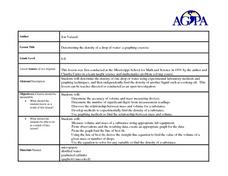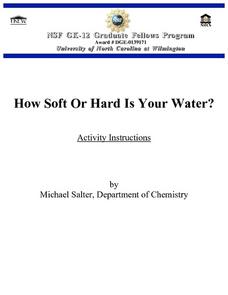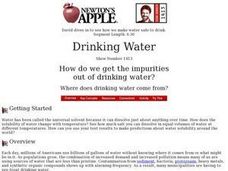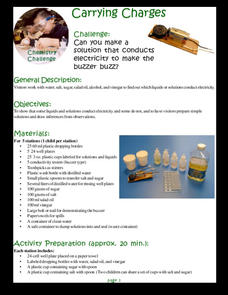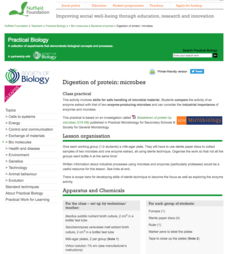Curated OER
Using Environmental Models to Determine the Effect of Acid Rain on an Ecosystem
Demonstrate to your middle school science learners how chalk breaks down in a weak acid. Discuss what affects acidic rain might have on ecosystems. Lab groups then choose one of two questions: "How does acid precipitation affect an...
Curated OER
Explore: 5th Grade Dissolved Oxygen
Fifth graders, in groups, use basic science process skills to measure and compare the dissolved oxygen levels and pH levels of distilled, stream, and pond water.
Santa Monica College
The Density of Liquids and Solids
There are underwater rivers that flow on the ocean floor thanks to a difference in density. Scholars learn about the density in both liquids and solids in the second lesson of an 11-part series. They then determine the density of water,...
Curated OER
Determining the Density of a Drop of Water-A Graphing Exercise
Middle schoolers determine the density of 1 drop of water. In this determining density lesson plan, students determine the mass and volume of a drop of water in the lab using appropriate lab techniques and calculate the density of a drop...
Curated OER
Water Quality
Students play the role of scientists testing for water quality in the area. In this ecology lesson, students determine the water sample's pH, temperature, dissolved oxygen and turbidity. They write a journal reflection after the activity.
Curated OER
How Soft or Hard is Your Water?
Learners test samples of water to determine how a chemical water softener affects water's ability to form suds. After collecting their data and analyzing their results, students answer follow-up questions about their lab.
Curated OER
What Is the Matter with Water?
Second graders observe matter in all 3 states : liquid, solid and gas, in an ice cream soda. In teams, they are given ice and teams compete to be the first to melt their ice. Winner gets the ice cream soda. They draw examples of 3 states...
Curated OER
The Perils of Drinking Water
Learners determine the presence of drugs in water. In this chemistry lesson, students experiment on water samples using thin layer and column chromatography. They determine the concentration of drugs present using graphical analysis.
Curated OER
Water You Can Use from the Air Conditioner
Students work together to research water quantity, quality and safety standards. They complete a lab to discover how to use the water from an air conditioner. They write a paper to show their findings.
NOAA
What Killed the Seeds?
Can a coral cure cancer? Take seventh and eighth grade science sleuths to the underwater drugstore for an investigation into emerging pharmaceutical research. The fifth installment in a series of six has classmates research the wealth of...
Curated OER
A SALT WATER-Y WORLD
Students observe a model of the distribution of the earth's water and compare the relative volumes and percentages of types of water on earth.
Curated OER
Still Waters
Students construct a still to turn seawater into drinking water. They estimate the cost of distilling it. They investigate ways to make the conversion more efficient. They track the source of their home drinking water and make a map of...
Curated OER
Water Unit
In this water worksheet, students review the properties of water including the density, boiling point, and evaporation. Students define mixture, solute, and solvent. This worksheet has 22 short answer questions.
Curated OER
Algae--Where does it Live?
Students discover algae. In this science lesson plan, students examine what green algae is and where it grows. Students test the growth of algae in four different types of water: lake water, well water, distilled water and tap water
Curated OER
Towers of the Lost City
Middle school marine scientists compare the pH change in distilled and saltwater as acetic acid is added one drop at a time. Then they compare the pH change in both when sodium hydroxide is added. This experiment demonstrates the...
Nuffield Foundation
Observing Osmosis, Plasmolysis, and Turgor in Plant Cells
Create the perfect conditions for osmosis. Young scholars use a microscope to observe plant cells exposed to distilled water or sodium chloride. They observe how osmosis creates turgid or plasmolyzed cells.
Sciencenter
Carrying Charges
What's all the buzz about electricity? Scholars take part in a scientific activity to test the conductivity of liquids and solutions. They first see if water, salad oil, alcohol, and vinegar cause a buzzer to buzz when electrodes are...
Curated OER
Fuel Cell Experimentation
With rising oil prices and increasing concerns over global warming, the pressure is on for engineers to develop alternative sources of energy. Among the new technologies being developed are hydrogen fuel cells, which young scientists...
Curated OER
Make a Solar Sill
Students design a solar still and purify water. In this earth process and design instructional activity, students observe how the heat of the sun helps to purify water. Students analyze why this could be helpful on a desert island. ...
Nuffield Foundation
Making Serial Dilutions
There's no need to water down the resource. A tutorial takes learners through the process of creating dilutions for any solution. Specifically, it focuses on serial dilutions with successive factors of 10.
Nuffield Foundation
Digestion of Protein: Microbes
Milk the resource for all it's worth. Young biologists perform assay techniques to test the digestion of protein. They place bacterial samples, fungal samples, trypsin solution, and distilled water on a milk-agar plate to see the effects...
Nuffield Foundation
Digestion of Starch: Microbes
Sugar isn't good for you, but it's great for microbes. A simple experiment has pupils investigate the digestion of starch by microbes to produce sugars. They apply two bacterial cultures, an amylase solution, and distilled water on a...
Curated OER
Eutrophication
Young scholars observe the effects of eutrophication and determine why it is harmful to aquatic ecosystems. They create mason jar ecosystems to observe the growth of algae in pond water. In addition, they observe the effect of...
Curated OER
This Stuff Makes Me Sick
High schoolers participate in a lab showing the effects of pesticides on Lumbriculus variegatus. Several extensions and variations are also included in this lesson including one which relates the experiment to how pesticides enter our...





